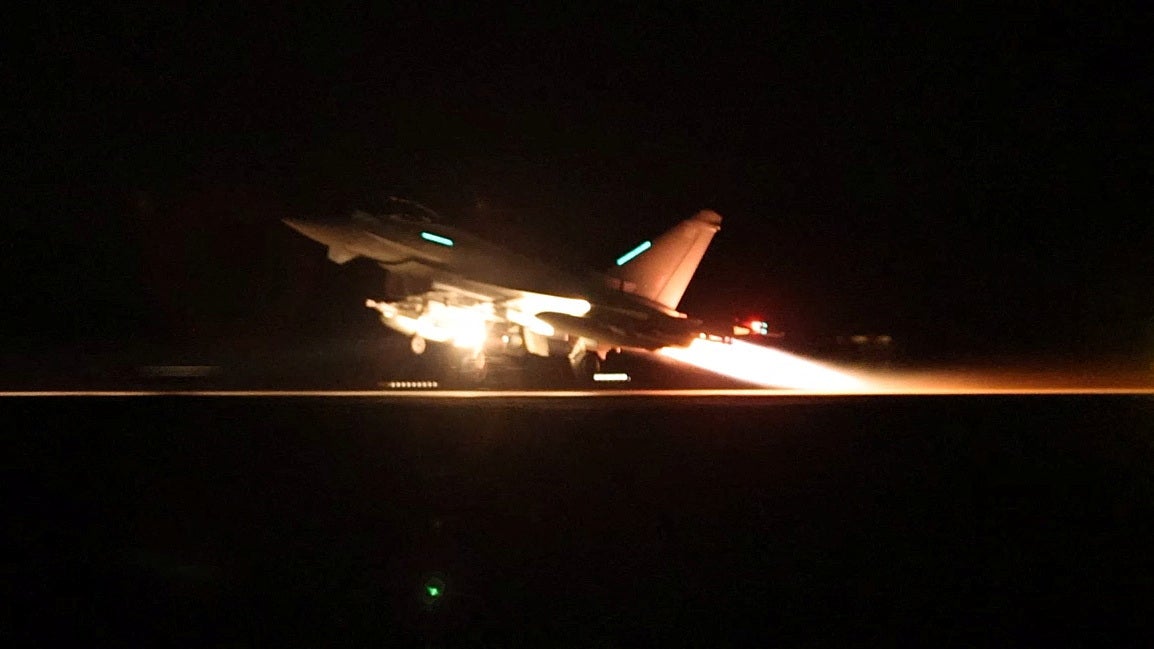
The United States and Britain launched military strikes against targets in Houthi-controlled Yemen on Thursday, according to two US officials. They used fighter jets and Tomahawk missiles launched from Navy ships to strike multiple targets. Did Biden violate the War Powers Act f 1973 by launching air strikes in Yemen? Let’s explore.
President Joe Biden stated that the strikes, which were backed by Australia, Bahrain, Canada, and the Netherlands, targeted areas used by Houthi rebels to “endanger freedom of navigation in one of the world’s most vital waterways.”
“Today’s defensive action follows this extensive diplomatic campaign and Houthi rebels’ escalating attacks against commercial vessels,” Biden said in a statement Thursday evening. “These targeted strikes are a clear message that the United States and our partners will not tolerate attacks on our personnel or allow hostile actors to imperil freedom of navigation in one of the world’s most critical commercial routes.”
Biden also added that he would “not hesitate to direct further measures to protect our people and the free flow of international commerce as necessary.”
The Houthi leader confirmed that Yemen’s capital, Sanaa, had been targeted.
“A brutal aggression against our country, for which they will pay absolutely,” Nasr Aldeen Amer, vice president of the Houthi Media Authority, said Thursday. “Without hesitation, we will not back down from our position in supporting the Palestinian people, whatever the cost.”
What is the War Powers Act?
The War Powers Act of 1973 (also known as the War Powers Act) “is a congressional resolution designed to limit the U.S. president’s ability to initiate or escalate military actions abroad.” As part of our governmental “checks and balances,” the law seeks to limit the executive branch’s authority when committing US military forces to an armed conflict without the consent of Congress. It requires the president to notify Congress within 48 hours of military action and prohibits the armed forces from remaining for longer than 60 days.
The Constitution divides war powers between Congress and the President. Although only Congress has the authority to declare war and appropriate military funding, the president serves as commander in chief of the armed forces.
Nonetheless, heavy U.S. military involvement in the protracted Korean and Vietnam wars of the 1950s and 1960s without congressional declarations of war blurred the lines between presidential and congressional power in terms of war authorization and conduct.
Congressional dissatisfaction peaked during President Nixon’s administration when secret bombings of Cambodia during the Vietnam War were ordered without congressional authorization. Congress passed the War Powers Act in 1973, intending to limit the President’s authority to wage war while reasserting its authority over foreign wars.
President Nixon vetoed the bill. However, Congress overrode his veto, and the resolution became law following the United States’ withdrawal from Vietnam in early 1973.
Since the War Powers Resolution of 1973, sitting presidents have submitted more than 132 reports to Congress. These include airlift and evacuation operations in Cambodia (1975), deploying forces to Beirut, Lebanon (1982/83), the Persian Gulf War (1991), and beyond. Challenges to the resolution include Ronald Reagan’s 1981 troop deployment to El Salvador, Bill Clinton’s 1999 bombing of Kosovo, and Barack Obama’s 2011 military intervention in Libya.
